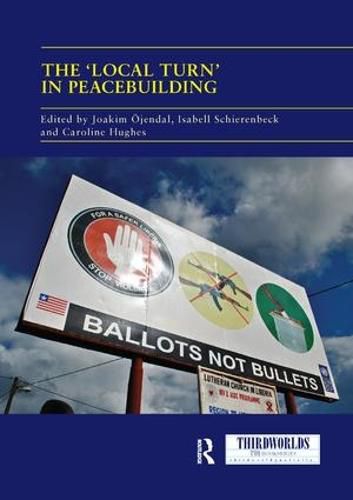Readings Newsletter
Become a Readings Member to make your shopping experience even easier.
Sign in or sign up for free!
You’re not far away from qualifying for FREE standard shipping within Australia
You’ve qualified for FREE standard shipping within Australia
The cart is loading…






Contemporary practices of international peacebuilding and post-conflict reconstruction are often unsatisfactory. There is now a growing awareness of the significance of local governments and local communitites as an intergrated part of peacebuilding in order to improve quality and enhance precision of interventions. In spite of this, ‘the local’ is rarely a key factor in peacebuilding, hence ‘everyday peace’ is hardly achieved. The aim of this volume is threefold: firstly it illuminates the substantial reasons for working with a more localised approach in politically volatile contexts. Secondly it consolidates a growing debate on the significance of the local in these contexts. Thirdly, it problematizes the often too swiftly used concept, ‘the local’, and critically discuss to what extent it is at all feasible to integrate this into macro-oriented and securitized contexts. This is a unique volume, tackling the ‘local turn’ of peacebuilding in a comprehensive and critical way.
This book was published as a special issue of Third World Quarterly.
$9.00 standard shipping within Australia
FREE standard shipping within Australia for orders over $100.00
Express & International shipping calculated at checkout
Contemporary practices of international peacebuilding and post-conflict reconstruction are often unsatisfactory. There is now a growing awareness of the significance of local governments and local communitites as an intergrated part of peacebuilding in order to improve quality and enhance precision of interventions. In spite of this, ‘the local’ is rarely a key factor in peacebuilding, hence ‘everyday peace’ is hardly achieved. The aim of this volume is threefold: firstly it illuminates the substantial reasons for working with a more localised approach in politically volatile contexts. Secondly it consolidates a growing debate on the significance of the local in these contexts. Thirdly, it problematizes the often too swiftly used concept, ‘the local’, and critically discuss to what extent it is at all feasible to integrate this into macro-oriented and securitized contexts. This is a unique volume, tackling the ‘local turn’ of peacebuilding in a comprehensive and critical way.
This book was published as a special issue of Third World Quarterly.